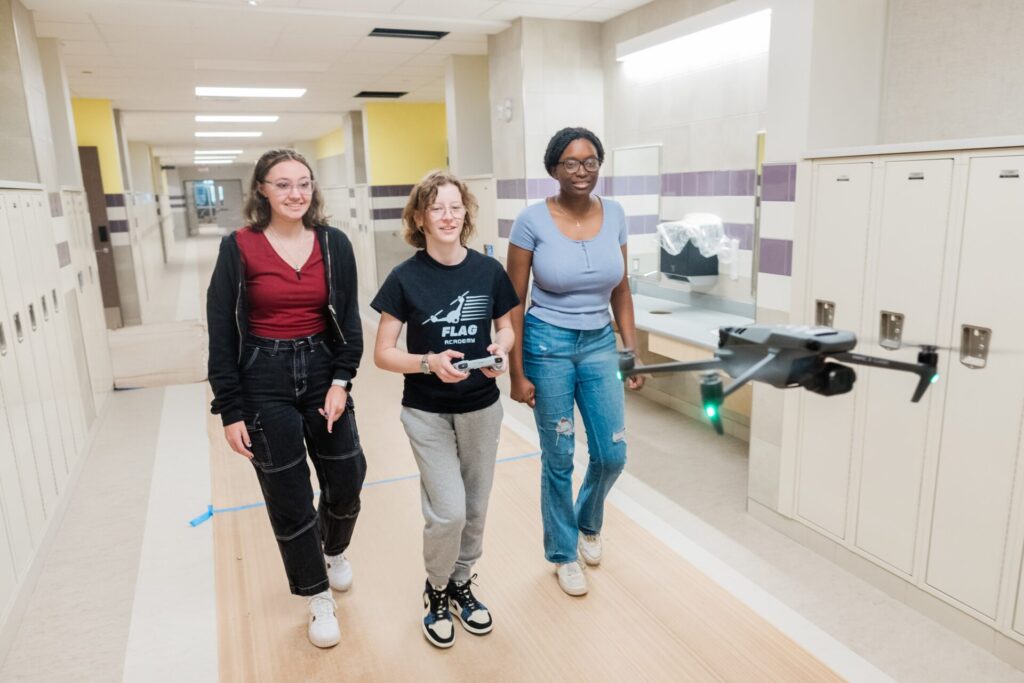What would it be like to work as a drone pilot? In May of this year, a group of 20 high schoolers in the Pittsburgh region began a training program to do just that.
Fly Like a Girl (FLAG) Drone Academy was created by three educators – Dr. Janeen Peretin, director of communication, innovation and advancement at Baldwin-Whitehall, Emily Sanders, assistant superintendent at Beaver Area and Dr. Kristin Deichler, assistant superintendent at South Fayette – who applied jointly for the Moonshot Grant.
They used that grant funding to purchase professional-grade drones and build a training program that could prepare high school students to take the Federal Aviation Administration’s drone pilots exam. Students from Baldwin-Whitehall, Beaver and South Fayette applied to join, as did several students from Ambridge and McKeesport.
What was it like to spend the summer in this inaugural cohort of FLAG Drone Academy? We spoke with three students from the program – South Fayette senior Gourisree Prasanth, Baldwin-Whitehall senior Tumi Ojo and Baldwin-Whitehall junior Molly Fircak – about their experiences and their plans for the future.
Remake Learning: What’s this learning experience like and what did you learn?
Molly: “It started right before school ended last May. For two days every month we would go to South Fayette High School and go through training with the drones and also the knowledge aspect of it – dealing with the weather and airspace and everything that you would need for the FAA remote pilot test.”
Tumi: “Before, I kind of felt like flying drones was just like a recreational, playful type of thing. But after that first day, I just really thought this could be a part-time job for somebody or even a full career.”
Gourisree: “The first day was kind of intimidating because there were just a lot of girls that I didn’t really know that well. But then once we started talking and then going out into the field and actually flying the drones, they were a lot of fun to work with.”
RL: What’s the best part about this learning experience?
Tumi: “The best part was getting to know the other girls. We weren’t in the same grades, so I didn’t really know them at first. But getting to know them – hanging out, eating lunch like those fun little moments, and then flying the drones, of course – those were really good moments.”
Molly: “It was cool to see all the other people from other districts because you never interact with them. Most of the people, even within just Baldwin, I didn’t know. So I now have new friends that I didn’t talk to before just because of this.”
RL: What’s the hardest part of this learning experience?
Gourisree: “The hardest part is probably the theory. Because the theory is so much aviation material. You have to know about airspace and the physics behind it. There’s a lot of content for the FAA test. It’s like 500-some pages of review material.
Molly: “It’s a lot of things that you’re not taught in school like the weather aspect of it. We don’t learn any of that in school. You have to know about wind speeds and fog.”
RL: What surprised you about this learning experience?
Tumi: “What surprised me most was probably how easy going it was. I thought it’d be like a school, and we would just be in a classroom. We’d have lectures and then a break and then just more lectures. But it was very relaxed. Like, there was a snack table. We could get up, and we didn’t have to ask to get a snack or go to the restroom. It was more chill than I thought it’d be.”
Molly: “I think the biggest thing that surprised me was how intricate everything was – all the laws and all the rules that are applied to these drones and how recently they’ve been a part of our society. It’s only since about 2014, and I felt like they’ve been around so much longer. I didn’t realize how little time they’ve been around, and how many laws already exist for them.”
RL: Have you been practicing your drone skills since FLAG ended?
Tumi: “After Drone Academy was over, Dr. Peretin and a few of the girls and I went to the high school during the summer to get footage of students painting the senior parking lots. We also got some footage of R.A. Lutz Elementary, which is a new school being built in our district. We flew the drones inside the school as it’s being built.”
Gourisree: “Recently I started working with my school football team to get drone coverage of their football practices. And I’ve started an apprenticeship with Dr. Lori Paluti’s company, Pittsburgh Drone Services, to work on robotic arms for drones.”
RL: What ideas or opportunities is this opening up for you as you think about your future?
Gourisree: “I actually want to do aerospace engineering. So this has a real connection to what I want to do in the future. Being able to hopefully get into it, and be more involved in during my education and even after it, is so cool. My internship started about two weeks ago. CMU already has a couple of robotic arms made. I’m involved in the process of testing the robotic arm for future use on a drone. Dr. Paluti received the robotic arm and we’re gonna bring it into our school and test it. I’ve allocated a free period every day, so I can work on it.”
Tumi: “I want to go into STEM, but I want to be more involved in health sciences, rather than aviation. But now that I’ve learned about this, I know that as I’m going into college and I’m a broke college student, doing this as a part time job to generate income would be really cool. Now flying drones is a possibility for me. I had not been thinking about aviation, but now it’s definitely on the list of things that I could do.” Molly: “I feel like definitely this could be a career. My mom works for a construction company and they were hiring me to do pictures of some of their projects. Her boss wants me to get a drone and take pictures for them and to hire me if I get my license. I’ve had friends whose parents are real estate agents that were like “We’d hire you to take pictures of real estate for us.” So people are already kind of interested. So that’s kind of opened me up to more stuff, too. … there’s just so many possibilities.’ I was talking with some of my teachers … There’s just so many things. And in the future, passenger drones are in the works. They have four people in a drone that’s giant and it can just fly like a helicopter.”
Authored by

Melissa Rayworth
Melissa Rayworth has spent two decades writing about the building blocks of modern life — how we design our homes, raise our children and care for elderly family members, how we interact with pop culture in our marketing-saturated society, and how our culture tackles (and avoids) issues of social justice and the environment.
